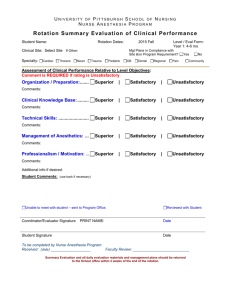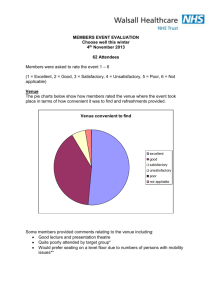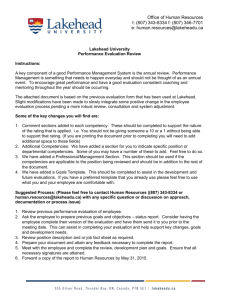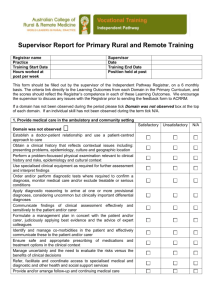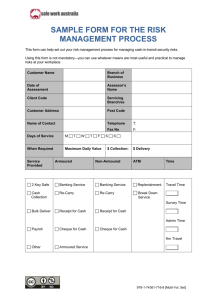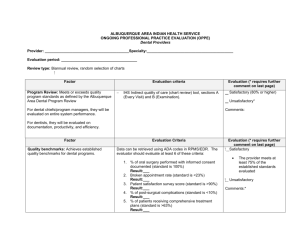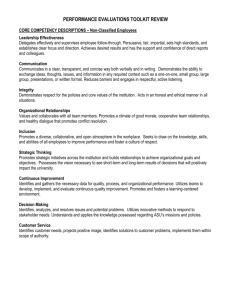Secretarial/Clerical Performance Assessment Employee Name
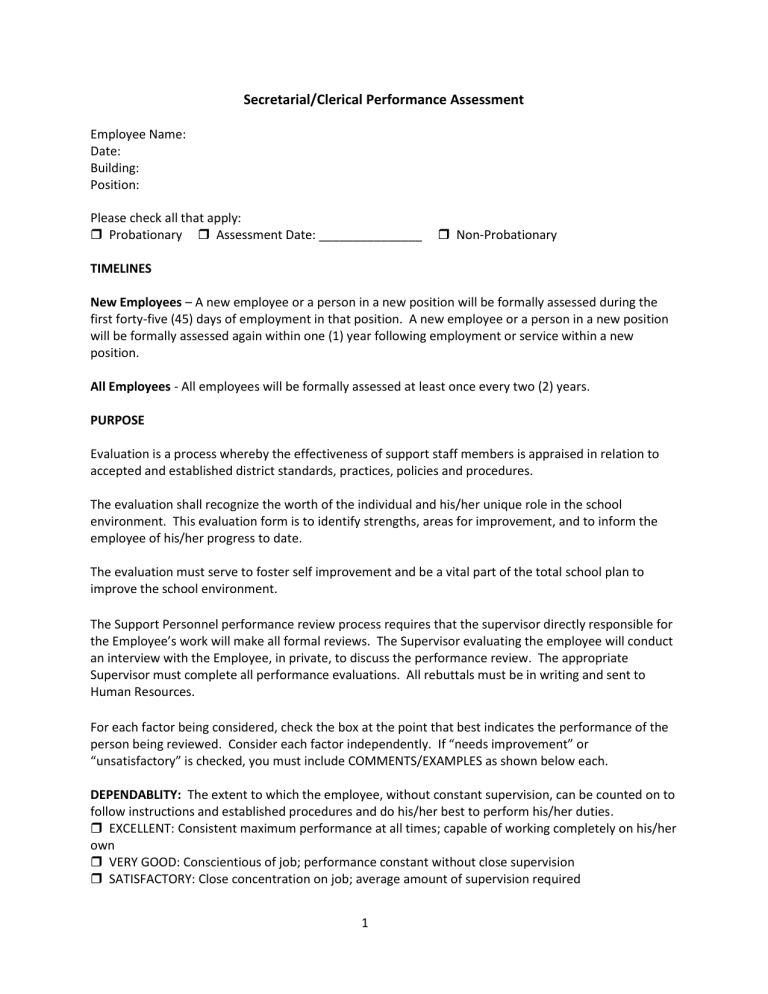
Secretarial/Clerical Performance Assessment
Employee Name:
Date:
Building:
Position:
Please check all that apply:
Probationary Assessment Date: _______________ Non-Probationary
TIMELINES
New Employees – A new employee or a person in a new position will be formally assessed during the first forty-five (45) days of employment in that position. A new employee or a person in a new position will be formally assessed again within one (1) year following employment or service within a new position.
All Employees - All employees will be formally assessed at least once every two (2) years.
PURPOSE
Evaluation is a process whereby the effectiveness of support staff members is appraised in relation to accepted and established district standards, practices, policies and procedures.
The evaluation shall recognize the worth of the individual and his/her unique role in the school environment. This evaluation form is to identify strengths, areas for improvement, and to inform the employee of his/her progress to date.
The evaluation must serve to foster self improvement and be a vital part of the total school plan to improve the school environment.
The Support Personnel performance review process requires that the supervisor directly responsible for the Employee’s work will make all formal reviews. The Supervisor evaluating the employee will conduct an interview with the Employee, in private, to discuss the performance review. The appropriate
Supervisor must complete all performance evaluations. All rebuttals must be in writing and sent to
Human Resources.
For each factor being considered, check the box at the point that best indicates the performance of the person being reviewed. Consider each factor independently. If “needs improvement” or
“unsatisfactory” is checked, you must include COMMENTS/EXAMPLES as shown below each.
DEPENDABLITY: The extent to which the employee, without constant supervision, can be counted on to follow instructions and established procedures and do his/her best to perform his/her duties.
EXCELLENT: Consistent maximum performance at all times; capable of working completely on his/her own
VERY GOOD: Conscientious of job; performance constant without close supervision
SATISFACTORY: Close concentration on job; average amount of supervision required
1
NEEDS IMPROVEMENT: Lacks application to job, or spends time unproductively; needs frequent supervision
UNSATISFACTORY: Rarely can be relied upon to perform work; constant supervision required
COMMENTS/EXAMPLES:
VOLUME OF WORK: The amount of work completed, including the ability to organize work, and the extent to which work is kept on schedule.
EXCELLENT: Consistently turns out an exceptional volume of work
VERY GOOD: Volume exceeds applicable average standard
SATISFACTORY: Produces applicable average amount of work
NEEDS IMPROVEMENT: Volume of work less than applicable average; improvement desirable.
UNSATISFACTORY: Volume of work is unacceptable
COMMENTS/EXAMPLES:
QUALITY OF WORK: The accuracy, thoroughness, neatness of work, attention to details and extent to which repetition of errors is avoided.
EXCELLENT: Rarely find errors in work; always exceptionally accurate and thorough
VERY GOOD: Neat, thorough, accurate worker; better than average
SATISFACTORY: Meets required standards; infrequent number of errors
NEEDS IMPROVEMENT: Work improving, but needs careful checking and attention
UNSATISFACTORY: Continually makes errors; quality of work unsatisfactory
COMMENTS/EXAMPLE:
JUDGMENT: Gives proper attention to details and decides a course of action when choice must be made.
EXCELLENT: Uses excellent judgment; has an ability to both apply procedures to situations and recognize situations requiring analysis
VERY GOOD: Uses good judgment; consistently applies procedures correctly in decision making; usually understands elements of situations requiring advanced decision making
SATISFACTORY: Usually applies procedures correctly; understands elements of situation requiring advanced decision making, but occasionally may need assistance
NEEDS IMPROVEMENT: Does not apply procedures correctly or consistently; fails to recognize unique elements in situations; decision making is poor
UNSATISFACTORY: Rarely understands the use of good judgment; cannot make acceptable decisions
COMMENTS/EXAMPLES:
COMMUNICATION: How the employee interacts/communicates professionally with co-workers, students, and/or public, both verbal and written.
EXCELLENT: Demonstrates excellent communication skills; communicates positively with students, staff and/or public
2
VERY GOOD: Consistently communicates/interacts with students, staff and/or public in a positive manner
SATISFACTORY: Generally communicates/interacts with students, staff and/or public in a positive manner
NEEDS IMPROVEMENT: Demonstrates difficulty interacting with students, staff and/or public in a positive manner
UNSATISFACTORY: Interacts with students, staff and/or public in a negative manner
COMMENTS/EXAMPLES:
INITIATIVE: Ability of employee to perform assigned tasks/job duties in a competent manner.
EXCELLENT: Self motivated; manages jobs and tasks in anticipation of needs in department; adopts unassigned tasks as needed for sake of department efficiency
VERY GOOD: Consistently accomplishes tasks without direct supervision; is able to relate duties to overall objectives
SATISFACTORY: Usually performs assigned jobs in a timely manner; occasionally needs assistance in setting task priorities
NEEDS IMPROVEMENT: Does not accomplish tasks without close supervision; needs detailed work plans in order to stay on task
UNSATISFACTORY: Rarely sets goals or establishes priorities when appropriate in completing assigned tasks
COMMENTS/EXAMPLES:
ADAPTABILITY: Demonstrates ability to adjust to new situations and responsibilities on the job.
EXCELLENT: Welcomes change as an opportunity to improve systems, service, or self
VERY GOOD: Adapts quickly to changes
SATISFACTORY: Usually adjusts to change in job procedures and work assignments without complaint; shows willingness to accept changes and new procedures
NEEDS IMPROVEMENT: Resistant to change; will adapt only out of necessity
UNSATISFACTORY: Rarely adjusts to changes in job procedures and work assignments; complains about changes; very reluctant to learn; interferes with implementation
COMMENTS/EXAMPLE:
PUNCTUALITY: Consider when the employee begins work according to approved work schedule.
SATISFACTORY: Consistently begins work at the time designated on work schedule
UNSATISFACTORY: Does not consistently begin work at the time designated on work schedule
COMMENTS/EXAMPLES:
PROFESSIONAL PRESENCE: General appearance and grooming are appropriate to school environment.
SATISFACTORY: General appearance is consistently appropriate for the school environment.
UNSATISFACTORY: General appearance is not consistently appropriate for the school environment.
3
COMMENTS/EXAMPLES:
ATTENDANCE: Consider sick days or time off from work when evaluating employee’s attendance.
SATISFACTORY: Consistently present for all assigned work days or during those occasional absences, the department or co-workers are not adversely impacted in the performance of their duties, responsibilities and services by the frequency or pattern of such absences
UNSATISFACTORY: Not consistently present for assigned work days and by the frequency or pattern of such absences, adversely impacts the department’s co-workers’ capacity for successfully carrying out their duties, responsibilities and services
COMMENTS/EXAMPLES:
OVERALL EVALUATION RANKING
EXCELLENT NEEDS IMPROVEMENT
VERY GOOD UNSATISFACTORY
SATISFACTORY
IF “NEEDS IMPROVEMENT” OR “UNSATISFACTORY” IS CHECKED, AN IMPROVEMENT PROGRAM MUST
BE COMPLETED
AREAS OF STRENGTH (Give Examples)
AREAS OF CONCERN (Give Examples)
GOALS
UNSATISFACTORY PERFORMANCE – IMPROVEMENT PROGRAM
Describe improvement needed, a program for improvement and time-line for completion of recommended improvement.
Attach.
EMPLOYEE COMMENTS
_____________________________________________________________________________________
_____________________________________________________________________________________
_______________________ ___________________ ______________________
Supervisor Signature Date Signature of Employee
Date of Next Evaluation
SIGNATURE DOES NOT CONSTITUTE AGREEMENT WITH EVALUATION, BUT MERELY ACKNOWKLEDGES
RECEIPT OF EVALUATION Original – Employee Services Copy – Employee
Copy – Supervisor
4

